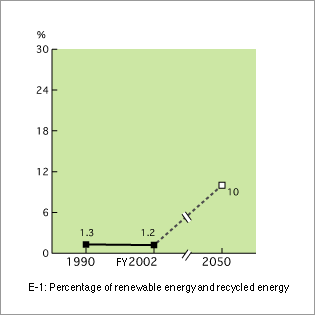ProjectsPast and current JFS projects
Indicators - Economy / Energy
E-1. Percentage of Renewable Energy and Recycled Energy
1.Current ValuesApproximately 1.2% (FY 2002)
2.Current Points
(out of a perfect score of 100 by 2050) 12 points
Calculation method:
(Current value - minimum value) / (2050 target value - minimum value) x 100
3. Explanation of Indicator
Accompanying the growth of the world economy, energy use and especially the use of fossil fuels is increasing. Japan has few fossil fuels; its energy self-sufficiency is about 5%. In particular, it relies on Middle Eastern imports for almost all of its oil, which accounts for 50% of its primary energy sources. Among the issues Japan faces are:
1) A risk of energy shortages due to the depletion of fossil fuels
2) A risk of wars and diplomatic crises arising from excessive dependence upon specific countries
3) A risk of global warming and climate change due to increased carbon dioxide emissions
4) A safety risk posed by waste products
It is essential that Japan improve its energy self-sufficiency. As effective means for doing just that and simultaneously reducing the above four risks, we are focusing on the development of a variety of renewable energies and recycled energy and on an improved ratio of use.
4.Target for 2050
10%
5.Ideal for the Future
50%
6. Rationale for Ideal and Target Values
Japan's Ministry of Economy, Trade and Industry calculates that there is a practical potential volume of 38~64 million kiloliters of renewable and recycled energy, and that this could account for 6-10% of the aggregate primary energy supply. Accordingly, our target for 2050 is 10%.
As to the ideal, a discussion among experts regarding the aforementioned four risks is needed. So for the time being we have presumed a value of 50%, assuming we will no longer be able to use oil due to limits on either the "sources" or the "sinks" and a switch has been made to that extent to renewable or recycled energy.
7. Source
Paper presented at the second meeting of New-Energy Division, General Energy Research Council, Ministry of Economy, Trade and Industry (2000)(Japanese only)
8. Notes
"Renewable energy" includes photovoltaic power generation, solar thermal utilization, wind power generation, snow and ice thermal utilization, biomass power generation, biomass thermal utilization and biomass fuel manufacturing. "Recycled energy" includes waste power generation, thermal utilization of waste and waste fuel manufacturing.



